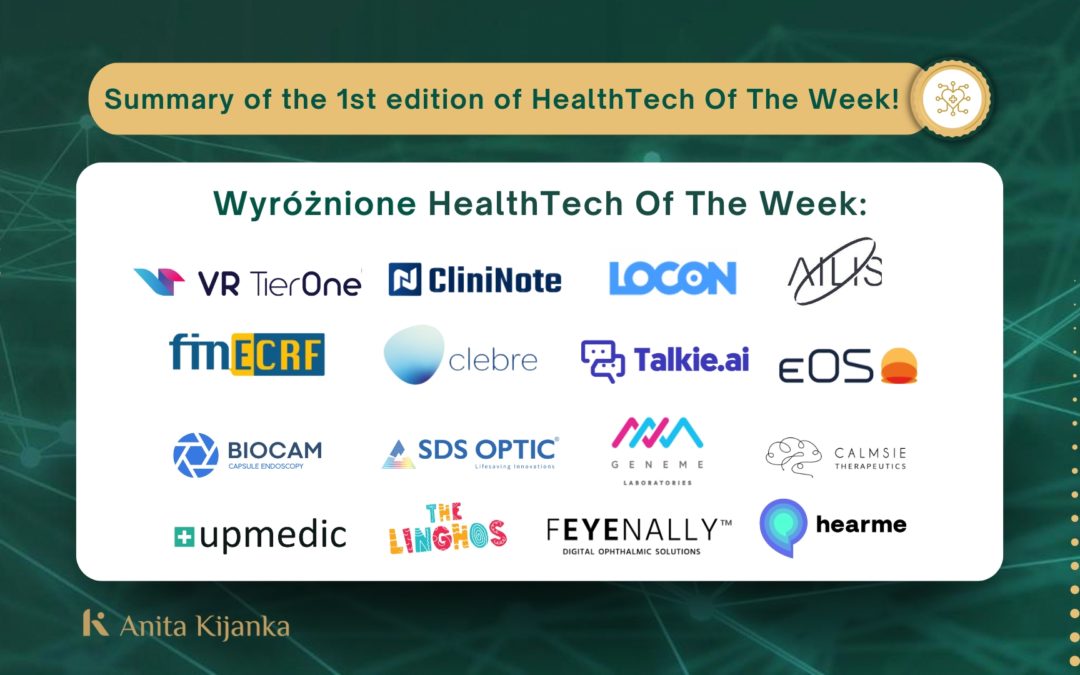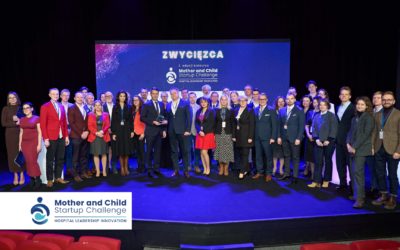After 8 months of conversations and interviews with representatives of Health Tech companies in Poland, and during a break before the second edition of the series, I share my insights on the communication challenges Polish startups face.
In November 2023, I started the Health Tech of the Week series, aimed at discovering and presenting to a broader audience the most innovative Polish solutions in health technology. This topic was not chosen by chance—we are currently experiencing a real „boom” in new technologies, with reports of breakthrough applications of artificial intelligence appearing daily. While technology can improve daily life, entertainment quality, and save time through optimizations, health remains paramount. Statistics cited by my interviewees often underscored this importance.
Michał Matuszewski from Ailis, involved in rapid breast cancer diagnosis technology, reminded us that this cancer accounts for about 37% of all cases among women, and data from the National Cancer Registry in 2020 is alarming—it is diagnosed 67 times daily. Other interviewees focused on issues such as insufficient psychological care for children (Calmsie), employee mental health support (HearMe), assistance for children with speech defects (Linghos), sleep apnea (Clebre), or providing basic ophthalmic care where possible (Feyenally). Their business models stemmed from a passion and desire to change the world.
Working over the past months with numerous startups and talking to experts such as Olivia Blanchard from Health Venture Lab, Jakub Chwiećko from the Medical Innovation Institute, and Kazimierz Cięciak from Comarch Healthcare, I gained a better understanding of the communication challenges faced by startups in Poland. Conversations with investors who work daily with innovative projects in the medical field also made me realize how much still needs to be done in this industry. Here are some of my conclusions.

Is It Too Early? Is It Too Late?
Communicating health-related issues carries a huge responsibility. Startups, as well as those describing their achievements, must remember that every word and promise in the text can give hope. Communication in Health Tech is not just about attracting interest in a product but having a real impact on people’s lives. This is a challenge for companies often still in the testing or clinical trial phase—when is the right time to say we are operational?
Many companies I talked to are waiting for the next edition of the Health Tech of the Week series because they are at too early a development stage. The decision to wait before revealing key information is understandable, especially when it can give a competitive advantage. However, delaying communication can be detrimental. The sooner startups learn the intricacies of media communication, the better prepared they will be for the big wave of interest that will happen sooner or later. When the project goes live, secures an investor, or enters into key partnerships, communication will be unavoidable and necessary for further development.
To properly gauge the moment to start communication, external specialist support can be helpful. An outsider can help indicate when it is worth waiting and which news should be published as soon as possible.
Good Specialists Need Specialists
I was greatly impressed by the knowledge of startup representatives—often from very narrow fields, acquired over many years. Most people creating or managing health startups are practitioners—specialist doctors who saw gaps in conventional healthcare and started their projects. Observing and meeting people who turn knowledge and years of practice into solutions that can have a real impact on others’ health is one of the most wonderful experiences associated with the Health Tech of the Week project. In this industry, it is very evident that behind every success stand competence, competence, and once again, competence. Especially in today’s world, where knowledge and competence are often less important than social media presence and views.
It is worth remembering this when communicating startup activities—the substance and expertise of their founders are their export goods. To translate often very specialized and niche medical language into terms that reach potential clients or investors, cooperation with experienced PR or marketing specialists is essential.

Seizing Opportunities
At the initial stage of business, it is especially important to seize every opportunity that opens up before us. This openness to new projects, collaborations, or contacts is often decisive at later stages of startup operation. Listening to my interviewees, I often had the impression that their actions were prompted by an impulse triggered by one email, a chance meeting, or a private situation that pushed them to act. Sometimes a great project or fruitful cooperation can arise from one such opportunity.
Here, I would like to especially thank the participants of this year’s edition of Health Tech of the Week, who found time not only to talk about their business but also to present solutions that I hope will become well-known: Talkie.ai; SDS Optic S.A.; Feyenally; Calmsie; Linghos; GeneMe Labs; upmedic; HearMe; eOS; Biocam; Ailis; System eCRF finECRF; Locon; CliniNote; Clebre; VR TierOne.
Thank you to all who supported and followed this project, and I invite more startups and companies to collaborate in the autumn edition of Health Tech of The Week.
Why do we focus on balance? How mental health is gaining value
In the "Health Tech of The Week" initiative, I discuss health comprehensively, emphasizing the importance of a holistic approach to individuals....
Cognitive Behavioral Therapy from Home Instead of the Office
They’ve moved therapists and patients in front of a computer screen, increasing access to therapy and mental health support—without losing its...
Technology Guarding the Lives of Newborns: Polish Startup Wins the Mother and Child Startup Challenge 2024
On November 27, 2024, Warsaw's Capitol Theatre hosted the grand finale of the third edition of the Mother and Child Startup Challenge—one of the...




